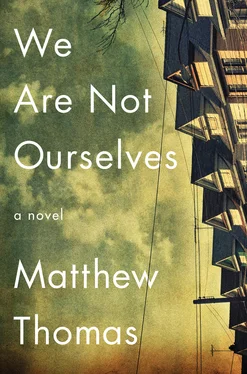“Nobody wants to hurt Ed here,” he said.
Then it came to her, as if Ed had whispered it in her ear: a palatable option for both sides that would forestall a protracted fight. His preoccupation with getting to work every day no matter what shape he was in, which she’d always found frustrating and even a little insane, would benefit her in the end. It would get him to thirty years.
“I’m not asking for a review process,” she said. “He has over a year of sick days coming to him. Let him finish this year and then give him the sick days.”
• • •
Stan called back the next day to say that Ed’s colleagues had volunteered to fill in his classes for the remainder of the semester. The school would keep him on the payroll through the summer. The sick days wouldn’t start counting down until the fall.
“I wanted to do that much for him,” Stan said. “He won’t have to teach. He won’t have to come in at all.”
“You say that like it’s a good thing,” she said. “Like you don’t know how much he loves his job.”
“Everyone knows how much he loves teaching.”
She wanted to believe that, in his heart of hearts, he had never really loved teaching. That would bring them closer, somehow. She wanted to believe he’d pretended to love it, pretended to be patient in reviewing material endlessly with imbeciles, in order to get his students to respond positively and ultimately make a distasteful job easier on him. The truth, she knew, was that none of it had been a sacrifice. He’d been happier with his career than anyone she knew. It was she who had made sacrifices for his happiness.
“None of those kids will ever know how much he gave up,” she told Stan.
• • •
On February 13, 1993, Ed went to work for the last time. A week later, she went in with him to sign some HR paperwork and learned that she’d miscalculated. She’d been correct about the amount of unused sick time coming to him, but she hadn’t understood that it wouldn’t count toward his pension. By then it was too late to reverse course. She tried to call Stan about it, to feel him out about procuring Ed some kind of time credit, but she got nowhere. She signed off by telling him he was a jerk and slamming down the phone.
Ed would finish in June with twenty-nine years of service to the city instead of thirty, which meant he was due a lower percentage of his salary. And since he’d be retiring before the minimum retirement age, he’d see that number drop even farther. The fourteen hundred dollars a month or so he’d receive from Social Security disability would make up part of the difference, but they were going to have to adjust to new means.
Ed hadn’t had a raise in four years, due to a budget freeze. There was rumored to be a raise coming in the next year or two that would have bumped him up to where he should have been all along. He’d never see the raise he’d already earned. He hadn’t been holding on for just one raise, though. He’d been about to enter the period in his career in which he would make real money. He’d have taught until he was seventy or older, his salary rising every year.
He was also losing his grant from the government, which budgeted thirty thousand dollars a year for his efforts and was up for renewal for four more. The loss of the grant was the keenest blow for her. It was the surplus, the comfort fund, the dream of luxury, the symbol of his status.
As long as Ed was on the payroll, she’d be covered by his health insurance, but once the sick-day checks stopped coming and he started receiving his pension, that would cease.
When he’d chosen a benefits plan, a few years after they’d gotten married, he’d chosen the plan that would deliver them — and her, in his absence — the most after-tax money per month. The trade-off had been that this particular plan didn’t confer health coverage on her in the event of his retirement or death. They’d made that decision with conviction, anticipating that she’d get health insurance in retirement through some job or other. They hadn’t known then that something would keep her moving every few years: the promise of more responsibility; a better salary; a higher-up who took exception to a strong-willed woman; her inability to keep her mouth shut when she found something ethically questionable.
In order to retain health benefits, she was going to have to keep a full-time job, any full-time job. Thinking longer term, she was going to have to survive at NCB, or at another city hospital, for ten years if she wanted to qualify for the basic New York City pension and have health insurance in retirement. That wasn’t going to be the easiest task at her age and pay scale.
She wished she and Ed had foreseen the health-coverage issues that would arise later, but who could predict the future to that degree? They’d thought he was staring at decades of work ahead. They’d bet on the bigger payout and lost. The cost to her was going to be that she would have to hold on to her job at a time when Ed needed her there most, to care for him.
If she lost her job before she’d been at it ten years, and had to buy insurance, there wouldn’t be enough money to go around, because not only would she no longer have her salary, but now there would be insurance bills in addition to the mortgage payments, utility bills, food costs, Connell’s tuition coming up in a couple of years (Ed had made her promise early after his diagnosis that she wouldn’t let his illness stop Connell from going to the college he wanted to go to), and whatever nursing costs she’d eventually have to pay for Ed while she was at work (six hundred bucks a week at the going rate), not to mention the cost of putting him in a nursing home (four grand a month and going up), the idea of which she wasn’t willing to entertain but which she knew was a possibility. And that was if she could buy anything like an affordable plan. The reality was that because of an episode of cellulitis that had caused one of her calves to balloon up to nearly twice its size a few months back, she might not be able to buy private insurance without spending every available dime on it — if she was insurable at all. And if she got sick without benefits, she’d be looking at losing everything. She’d worked her whole life and diligently socked away, from the age of fifteen on, 10 percent of every paycheck she’d ever gotten, and still her family’s fortunes could be ruined overnight because the American health care system — which she’d devoted her entire professional career to navigating humanely on behalf of patients in her care, and which was organized in such a way as to put maximum pressure on people who had the least energy to handle anything difficult — had rolled its stubborn boulder into her path.
For years, Connell had heard his father talk up how much he looked forward to teaching him to drive, but when he turned sixteen and got his learner’s permit, he had to cajole his father into letting him behind the wheel. They drove through a whipping March wind to the parking lot in front of Macy’s in the Cross County Shopping Center. His father got out, went around to Connell’s side, and waved him to slide over.
His father sat calmly as Connell practiced accelerating, braking, turning, parking in a spot, and backing up. Once Connell worked up the nerve to venture from the lot onto the streets, though, his father looked terrified. As they approached the first intersection, he hit an imaginary brake. “Slow down!” he shouted.
“But it’s green!” Connell shouted back, though he applied the brake anyway.
At the next light, Connell signaled, slowed, and turned left.
“Watch the building!” his father said, his leg pumping the floor.
Читать дальше
Конец ознакомительного отрывка
Купить книгу












